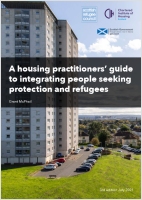The law on council tax rebate (CTR)
Contents:
What is council tax rebate (CTR)?
In the law a council tax rebate is known as a ‘council tax reduction’ (CTR) but some local authorities call it council tax support. It is administered by the same local authority that issues the council tax bill. CTR reduces the council tax bill of the person who is liable to pay it (normally the owner occupier or tenant). It can reduce the full liability (net of any discount) to a lower figure, including to nil. In Scotland there are three different kinds of CTR:
- ordinary (or main) CTR
- alternative maximum council tax reduction (‘second adult rebate’), and
- band E to H relief.
If a person is entitled to more than one kind of CTR they get whichever one is the highest (working age, Regulation 14(3A),(9); pension age Regulation 14(3A),(9)).
The law about local CTR in Scotland
In Scotland under the Local Government Finance Act 1992, s80 the Scottish Government has the power to set the legal framework that governs entitlement to CTR. The rules about entitlement, including the eligibility conditions relating immigration status are in the Scottish Council Tax Reduction Regulations. In Scotland there are two sets of regulations, one for working-age applications and one for pension-age applications (see next section). All local councils must comply with these regulations and they cannot (unlike in England) set their own financial conditions that determine how the award is calculated. There is no equivalent discretionary council tax reduction (as in England and Wales).
Although the regulations about entitlement are set by the Scottish Government, all three kinds of CTR count as public funds for immigration control purposes as this is determined by the UK government through the immigration rules (see also section below on claims by couples).
Who is eligible for CTR?
The law about who is eligible for CTR is in Part 4 of the Council Tax Reduction (Scotland) Regulations 2012 for working age applications (Regulations 16, 17 and 19) and Part 4 of the Council Tax Reduction (State pension Credit) (Scotland) Regulations 2012 for pension age applications (Regulations 16, 17 and 19). These regulations mostly mirror the eligibility conditions for universal credit and housing benefit (although there are some small differences). Regulations 16 and 19 for both working age and pension age applications have been amended by the Council Tax Reduction (Scotland) Amendment Regulations 2015.
A person is ineligible for CTR if:
- s/he is ‘subject to immigration control’ (Regulation 19); or
- s/he is ‘treated as not being in Great Britain’ (Regulation 16).
For CTR purposes ‘subject to immigration control’ has the same meaning as for universal credit and like UC nationals of ECSMA or CESC treaty states (i.e. North Macedonia and Turkey) are excepted and entitled if they have leave or some other right to reside (working age, Regulation 19(2), as amended by SSI 2015 No 46, reg 5; pension age Regulation 19(2), as amended by SSI 2015 No 46, reg 17).
A person is treated as not being in Great Britain in the same circumstances as for universal credit except that:
- in addition to those who are exempt from this exclusion for UC (e.g. refugee status etc.)
a person is also exempt (and so eligible for CTR) if:
- s/he is in receipt of income support, income-based JSA or income-based ESA, or
- s/he is a Crown servant, or a member of HM armed forces posted overseas; and
- a person is eligible for CTR if s/he is habitually resident and either:
- s/he has a right to reside as a jobseeker, or
- s/he has a right to reside as a Zambrano carer.
This is because (unlike for UC/HB) only the initial three months is listed as being a non-qualifying right to reside (working age, Regulations 16(4),(5)(h), 17; pension age, Regulations 16(4),(5)(h), 17).
The effect of the EU Settlement Scheme
For CTR (unlike eligibility for UC/HB and housing) Pre-Settled Status granted under the EU Settlement Scheme is not disregarded when considering whether a person has ‘right to reside’ (only the initial three months right to reside is – see above). Therefore, a person who is habitually resident is entitled to CTR as soon as Pre-Settled Status is granted. This is because the regulations have not been amended to disregard it (unlike in England and Wales where the CTR rules have been amended from 1 April 2020).
As with UC/HB, a person who has been granted EU Settled Status is eligible for CTR if s/he is also habitually resident.
Other matters (applications, claims by couples, etc.)
A person must make an application for CTR to be entitled to it, by completing an online or written form and sending it to the authority who issues the council tax bill, or by telephone if the local authority has published a telephone number for that purpose (a claim for universal credit is not a claim for CTR). The applicant must submit any documents reasonably required to complete their claim (working age, Regulations 83, 84; pension age, Regulations 63, 64). But unlike in England and Wales there is no legal requirement to provide a national insurance number (for the applicant or their partner).
If the liable person is a member of a couple, the law about CTR works in the same way as for housing benefit – the rules about eligibility only apply to the applicant and not his/her partner (working age, Regulations 14(3), 14A(3), 82; pension age, Regulations 14(3), 14A(3), 61). But for immigration control purposes CTR, including any increased award arising from the applicant’s (ineligible) partner being included in the award, counts as public funds so it might not be safe to apply for it.
The authority must include as part of the applicant’s household any child who s/he or his/her partner are responsible for (working age, Regulations 5, 10, 11; pension age, Regulations 5, 10, 11).



